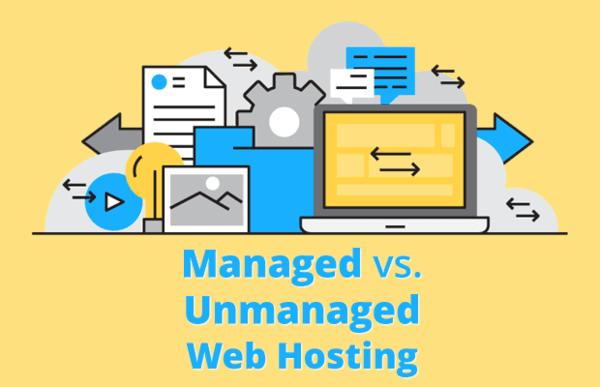
Why You Should Consider Mesh Networking for Your Home or Small Office
December 20, 2018
The Debate between Managed and Unmanaged Hosting
January 8, 2019There were days when businesses used to store their data and applications on local systems or servers. Those days are long gone now. Users from both ends of the spectrum, from single users to enterprises, are availing the various types of hosting methods to optimize their process.
Consequently, a large number of hosting providers have evolved in the market. They provide reliable hosting services at affordable costs to relieve you from the hassles of hardware maintenance and IT process.
Here are some of the types of hosting that you can avail to store and access your data and application.
Dedicated Server Hosting

Let us take the analogy of a house with four bedrooms. You are the only person living in the house and can do whatever you want with it. All the amenities of the house are reserved for you. This scenario is the same as availing a dedicated server.
A dedicated server is referred to a physical server, the resources of which are utilized by a single tenant. Let us assume that you avail a dedicated server with the hosting provider for your website.
The resources of the server such as RAM, storage, graphics card, processor, etc. is used only for your website. You can customize the server as per your requirement and choose the operating system or the software you want to install in it.
There are various advantages of availing dedicated server hosting. Firstly, as you are the only tenant and the resources are dedicated solely for your purpose, no other process can hamper your productivity.
Imagine a physical server with two websites A & B hosted on it. As website A draws data traffic at peak hours, it utilizes more processing as well as storage resources. The overutilization of resources from website A can cause website B to crash to underperform as it is not able to get even the minimum amount of resources to function.
Secondly, there is a security concern. Although the hosting providers deploy all the critical security safeguards in the data center as well as their services to keep your data safe, it is always wise to take precautions yourself.
The dedicated server hosting enables you to host your application and data on the server without any interference from other tenants. Hence, any cyber attack on other application or website cannot hamper the performance of your application or integrity of your data.
However, dedicated server hosting can prove to be more expensive than other types of hosting because of the obvious benefits. Hence, while choosing dedicated server hosting, you should evaluate your process and make sure if you need dedicated resources and enhanced security for your process.
Shared Server Hosting

Again, consider a house with four bedrooms and four tenants. The four bedrooms are shared by the four people, but one person can use any number of bedrooms as per his requirement leaving the other three with no place to live.
Shared hosting, as the name suggests, is the hosting of multiple tenants on a single server. The resources of the server are shared among the tenants. However, there is no restriction on the type of application or data you can host on a shared server. A shared server can host a website, application, and software on the same server.
Shared hosting is preferred for small-scale applications as they cannot fully utilize the server resources. Imagine you have a server with 8 GB RAM and 512 GB storage with eight applications hosted on it. The resource will be distributed among these applications with no special preference given to anyone. It means that an application can utilize more than 2 GB of RAM if other applications are not using their resources. One application also tends to utilize more RAM when unexpected traffic is incident on it. This can hamper the performance of other applications.
Another aspect of shared hosting is that as the application develops, it is in need of more resources. The application then must be migrated to another server as the shared server cannot provide more resources. The migration of the application data is a tedious task in itself.
The application that does not experience high traffic and deals with huge amounts of data like some static websites can opt for shared hosting.
Virtual Private Server Hosting

Getting back to the house analogy, you have a house with four bedrooms and four people living in it. But, this time, each person gets one bedroom each. The person cannot enter the other bedrooms and cannot house anyone in them. Hence, each person gets an equal living space.
Virtual Private Server or VPS hosting is the same as shared server hosting apart from a significant difference. By the implementation of virtualization technology on the physical server, a single server is divided into multiple private servers.
We again consider a server with 8 GB RAM and 512 GB storage. Let us assume that eight applications are hosted on it. Contrary to shared server hosting, the physical server is divided into eight virtual servers with each allotted same resources, that is, 1 GB RAM and 64 GB of storage.
The main advantage of VPS hosting is that other applications cannot impact the performance of your application. Although they share the same server, each tenant gets a dedicated server to perform the desired functions. However, the resources are still limited, and the resource requirement can be met only by hardware replacement or decreasing the number of tenants.
The VPS hosting can be used by small and medium-sized applications with a low budget and security concerns as it is cheaper than dedicated server hosting and more secure than shared hosting.
Colocation Hosting

Colocation hosting is the hosting when the customer avails the data center facility of a provider to host his/her physical server. In this case, the hardware belongs to the customer. Only the infrastructure of the data center and the services of the hosting provider is availed by the customer.
Most users opt for colocation hosting as they possess the hardware but do not have the infrastructure to host them. The data centers, however, provide state-of-the-art infrastructure for the hardware. These include redundant cooling, power, and network equipment, multiple firewalls, among others.
The services offered by the hosting provider may differ with each provider. Some of the features include management of servers, hardware replacement, cable installation, etc.
Depending on the hardware, you can opt for 1U, 2U, 4U, 10U, 21U, or even 42U rack space. The data centers in which your server is hosted can be classified into various tiers depending on the quality of the infrastructure.
You can opt for colocation hosting if you possess the hardware but need a hosting provider with advanced data center and services.
Cloud Hosting

Last but certainly not the least, the hosting providers offer cloud environment to host your applications. Cloud has announced itself on the hosting landscape, and it is here to stay.
So, what is a cloud?
Cloud computing refers to a cluster of servers working synchronously to perform complex functions. Like any other type of hosting, the cloud servers are situated in data centers. However, these servers are interconnected with each other.
With the help of virtualization, every Virtual Machine (VM) created on the physical servers act as an independent server. The VMs can be moved from one server to another. Hence, if one server crashes, your application and data are still secure. This makes your application completely hardware-independent.
Moreover, your application on the cloud can be scaled instantly. As the cloud comprises a group of servers, if your application needs extra resources, the resources can be provided easily.
Due to its flexible nature, the cloud providers charge you as per your resource usage. There are numerous cloud service providers available in the market. You must choose the cloud provider that offers a secure and flexible environment for your process.
To Sum it Up!
There are various methods of hosting available for you to host your application. You need to choose the hosting that is cost-efficient, secure, and by your application.
On the one hand, a dedicated server offers you with dedicated access to resources but is also expensive than other types of hosting. Whereas, on the other hand, shared hosting offers a cheap option, but you have to share your resources with others. VPS hosting is a combination of both, where you get dedicated resources, but on the shared server.
Colocation enables you to host your physical server in the data centers of the hosting provider. You get all the benefits of the data center infrastructure for your server.
Cloud hosting is another hosting option that offers you with a secure and flexible option to host your data.